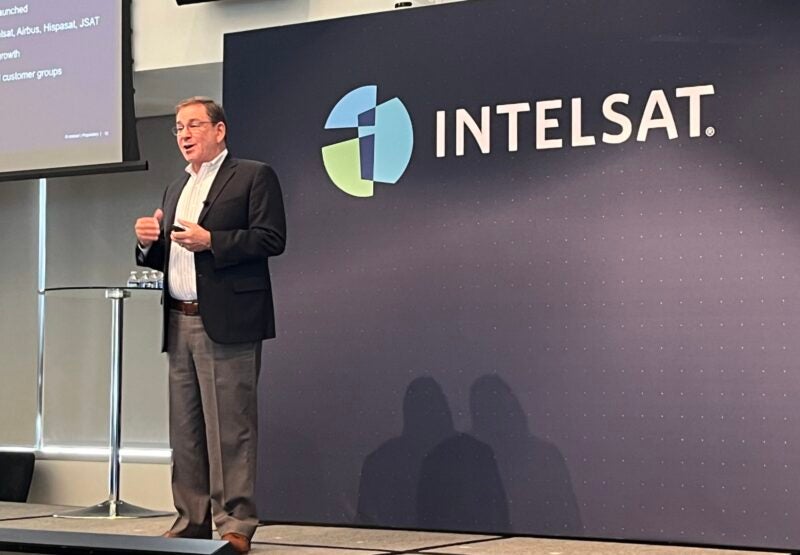Intelsat Expects $2.1B in Revenue This Year, Execs Outline Pivot to Solutions Provider

Intelsat CEO Dave Wajsgras during Intelsat’s investor and media day on Nov. 30, 2023. Photo: Via Satellite
McLean, VIRGINIA — Intelsat expects to earn $2.1 billion in revenue this year, CEO David Wajsgras said during an investor day event on Nov. 30, giving a rare look at the company’s finances and outlining its “strategic reset” from a bandwidth supplier to an end-to-end solutions provider.
Executives said Thursday that the company is in the best financial position in a long time, after using C-band proceeds to pay down its debt. Intelsat emerged from bankruptcy proceedings about 18 months ago, cutting its debt in the process from from approximately $16 billion to $7 billion.
CFO Toby O’Brien said Intelsat began 2023 with about $5.8 billion in debt. The company’s debt covenants required it to use half of the after-tax proceeds of C-band money — both reimbursement and accelerated clearing payments – to pay down its debt. Intelsat paid about $2.8 billion toward its debt this year and paid off the balance of a term loan. Now, the company expects to end 2023 with $2.1 billion in net debt.
“[It’s] clearly the best position the company has been in a long, long time, with flexibility to create value as we move forward,” O’Brien said.
Wajsgras gave a picture into 2023 financials, that Intelsat expects adjusted EBITDA in 2023 to be 43%. The company expects to close out the year at roughly a 2.3 net leverage ratio, and $4.5 billion in backlog.
Wajsgras described the company’s overarching strategy to be a “leading end to end provider of seamless and secure satellite based network solutions to government and commercial customers globally.”
He put Intelsat’s reset in the context of changes in the satellite industry, estimating that five years ago, the satellite industry had a $12 billion to $15 billion market for wholesale bandwidth, and there is now a $50 billion addressable market for satellite connectivity.
“We were wholesale bandwidth providers, we’ve evolved with our customer group,” Wajsgras said. “The folks that can execute and deliver end-to-end connectivity are the companies that are going to win in this new industry. We’re now looking at about a $50 billion total addressable market — three to four times the size of what we were looking at before.”
Wajsgras outlined Intelsat’s growth markets as commercial aviation, government, mobility (including land mobility), and networks. Broadcast remains the most profitable portion of the business, but it is declining in revenue.
A key part of offering managed, end-to-end services is Intelsat’s partnership with Low-Earth Orbit (LEO) operator OneWeb, now owned by Eutelsat. Wajsgras said SpaceX’s disruption in the industry with its Starlink LEO broadband constellation has “raised everyone’s game,” and stressed Intelsat is competitive.
“When customers are asking for or demanding a multi-orbit solution, we can offer a multi-orbit solution. When they’re not, we can offer world-class GEO satellite services,” Wajsgras said. “We are winning against LEO providers when it’s head to head. Not all the time, but we are winning our fair share of business.”
MEO Constellation and Fleet Investment Plans
Intelsat currently has 58 GEO satellites, and Wajsgras expects that GEO fleet size to stay above 50 satellites. It will likely decrease a bit as software-defined satellites offer more capacity, so some legacy satellites will not be replaced. Intelsat is not expecting a capacity shortfall in the coming three to five years, and has capacity partnerships in place, including with Sky Perfect JSAT.
Intelsat is investing in four software-defined satellites, two from Airbus and two from Thales Alenia Space. Wajsgras said he’s confident all four software-defined satellites will be in service by the first half of 2026, despite reports of potential delays with the Airbus OneSat program.
The company is considering investment in a Medium-Earth Orbit (MEO) constellation, and issued an RFP over the summer. Wajsgras said Intelsat is going through the information and looking at the market to decide to move forward, and will make a decision some time in 2024.
CTO Bruno Fromont said Intelsat received proposals from legacy manufacturers and new space companies. If Intelsat moves forward, it will probably “mix and match” proposals.
A MEO constellation could be an optimal investment from both customer experience and financial payoff, compared to GEO and LEO. Intelsat has doubts about the sustainability of LEO-only business models, even though the customer experience is strong, Fromont said.
A potential MEO investment would allow Intelsat to go beyond the traditional fixed satellite services market. “You can integrate different types of missions and aggregate different sources of revenue on the constellation, which makes it very interesting. On the other hand, new missions [such as] laser communications are nascent markets. That’s where the due diligence is to go further,” Fromont said.
Wajsgras said he’s comfortable with both the technology and network architecture in MEO. “What we’re still working through are the use cases and the longer-term economics to make sure that its value-accretive to Intelsat,” he said. “We don’t want to miss the mark here. If we go down that path, it’s going to be a benefit for all of our stakeholders.”